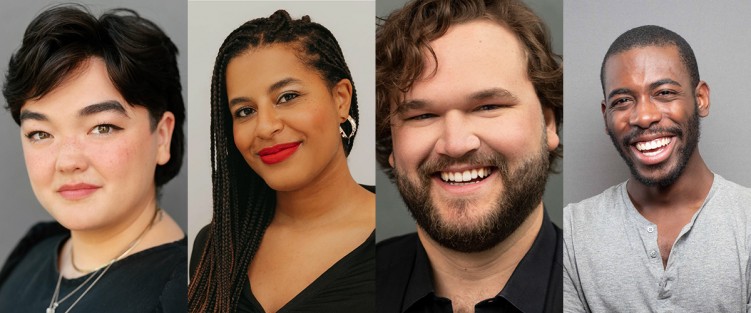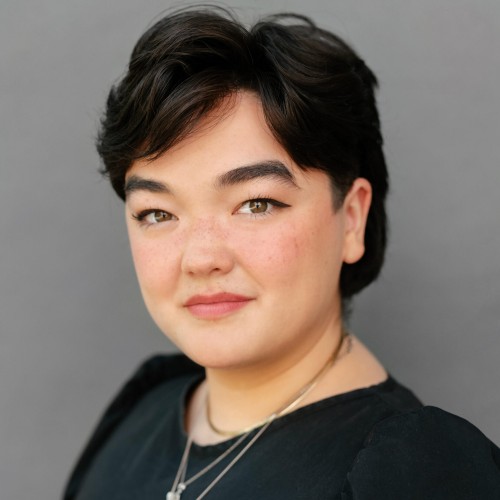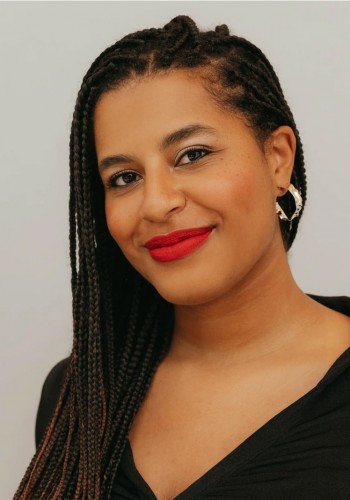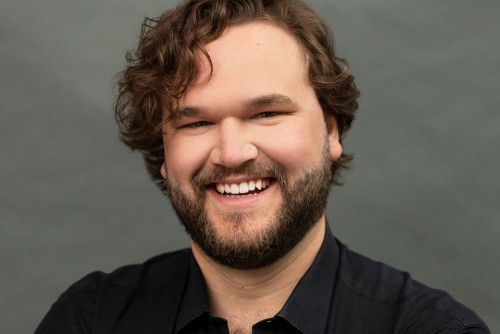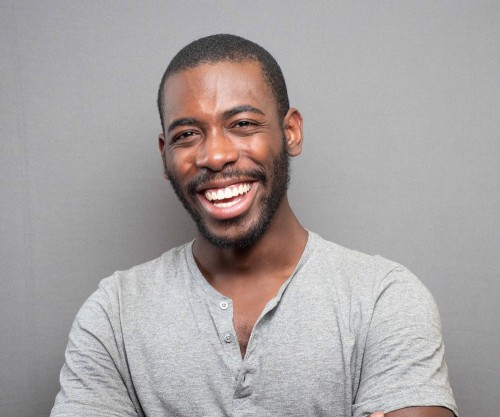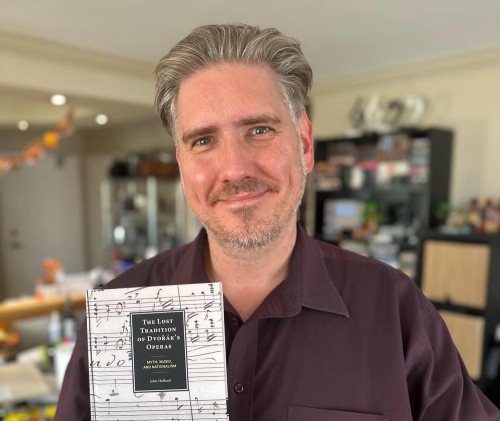Musical Flights takes the COC on the road.
In a canny move, the Canadian Opera Company takes their orchestra, music director Johannes Debus and four soloists on the road for five concerts previewing the COC’s upcoming fall and winter productions: Nabucco, Faust, Madama Butterfly and Eugene Onegin. Gripping stuff, but not exactly light summer fare, so the performances also include a generous sprinkling of Broadway, from shows such as Oklahoma!, My Fair Lady, West Side Story and The Sound of Music.
As interesting as the idea of the mini-tour, and the music that will be performed, is taking a look at the soloists who will be performing, in their own right as musicians, and because collectively they exemplify the extraordinary impact the COC Ensemble Studio has had since its founding in 1980 – not only on the lives of individual career-edge musicians, but on the COC’s own evolution as an ensemble.
Midori Marsh, soprano, took first prize in the COC Ensemble Studio Competition in 2019, and has remained thoroughly engaged in the local opera and vocal scene. With the COC she has played Nella in Gianni Schicchi, Annina in La traviata, Papagena in Magic Flute, and was in the cast of Ian Cusson’s Fantasma. Beyond the COC in the wider local operatic and vocal scene, she was in the 2020 recording and the 2023 cast of Tapestry Opera’s award-winning Rocking Horse Winner, and has appeared in Soundstreams Electric Messiah, to give just two examples.She also participates actively in the musical life of orchestras and choirs, large and small across the region.
One particularly memorable example comes to mind: a concert Marsh co-curated with flutist Laura Chambers, for Marsh as soloist and the newly reconstituted London Symphonia. Titled Under The Moon repertoire included the Mad Scene in Lucia di Lammermoor and Song to the Moon from Rusalka, and a range of songs by Stephen Sondheim. So the “musical flights” required for this particular COC roadshow should come easy.
Charlotte Siegel, soprano, self-describes herself on instagram as a “controlled screamer (a.k.a. opera singer)”, got her early start at Regent Park School of Music and is deeply committed to “paying things forward” musically, within the community, hand in hand with her own operatic career – something she addressed in a story in The WholeNote in February 2022. Third Ensemble Studio prize winner in 2019, she maintains strong COC ties and was a regular throughout the recently concluded 2023/24 season: Musetta in La Bohème, Donna Elvira in Don Giovanni, Lead Hen/Innkeeper’s Wife in The Cunning Little Vixen and Handmaiden 1 in Medea. Up next: Anna in Nabucco.
Matthew Cairns, tenor, was the Ensemble Studio first prize winner in 2018. Last seen at the COC as Macduff in Macbeth in spring 2023, this year he hits the ground running as Ismaele in the COC’s season-opening Nabucco, then returns as the Drum Major in Wozzeck, in what is described as “a breathtaking new production from renowned South African multidisciplinary artist William Kentridge …featuring animations and projections, painting, archival footage, film, and puppetry.” Oh and, by the way, dense and dazzling music.
Korin Thomas-Smith, baritone, rounds out Musical Flights’ versatile foursome of singers. Born and raised in Toronto, his resume also reflects work with other core Toronto companies such as Tapestry Opera, Citadel+Compagnie and Against the Grain Theatre. He joined the COC Ensemble Studio in 2023/24, then stayed for a second year in 2024/25. In 2023/24 he appeared memorably as Harašto (The Poacher) in The Cunning Little Vixen and Malatesta in Don Pasquale. He returns as Wagner in Faust, Second Apprentice in Wozzeck, and Captain in Eugene Onegin.
So, heads up! You have five opportunities to hear a gifted musical foursome take musical flight prior to the start of the mainstage season (and do some aural homework on what the season’s mainstage shows have on offer). You also get a glimpse into the underlying philosophy behind the Ensemble Studio which since 1980 has recognized and nurtured the solo and ensemble talents of hundreds of operatic artists: Emily D’Angelo, Gordon Bintner, Ambur Braid, Isabel Bayrakdarian, John Fanning, Joseph Kaiser and Allyson McHardy, to name just a few. Drag someone along who thinks they don’t like opera. After all, even if you are worried that the mainstage show excerpts might take some digesting, you can offer them a bunch of Broadway for dessert.
Shows are Sep 7 (Base 31 in Picton), Sep 13 (George Weston Recital Hall), and Sep 14 and 15 at Harbourfront Centre, and prices range from $79 to free, depending on the venue, so check the daily listings for details. And make a note: Centre Stage, this year’s Ensemble Studio Competition, takes place, with full orchestra, at the Four Seasons Centre for the Performing Arts, on October 30.
Ten years between Jakobins? Worth the wait.
John Holland, bass-baritone, is a professional opera singer and musicologist in Toronto. He also has a particular driving passion: founding the Canadian Institute for Czech Music in 2013; and arranging and performing in the Canadian premiere of Antonín Dvořák’s little-known opera, Jakobin, in 2014. Since then (among many other things), he has written and published a book on Dvořák’s operas, The Lost Tradition of Dvorák’s Operas: Myth, Music, and Nationalism.
Concurrently, he produced a Year of Czech Music Opera Festival in Toronto, consisting of three operas running over the course of 2024. The remount of Jakobin, ten years after its Canadian premiere, is the last of the three. Presented by the Canadian Institute of Czech Music in partnership with William Shookhoff’s Opera By Request, it will be performed, in concert with a chamber orchestra, on September 13, in Jeanne Lamon Hall, Trinity St. Paul’s Centre.
The Jacobins: The date of the first performance of Jakobin, in Prague on February 9, 1889, perhaps offers a few clues to the nationalistic and political underpinnings of what is, at face value, a sweetly melodious pastoral comedy, with tangled love interests, a suitably villainous villain and a happy ending. The Prague premiere was, after all, 100 years after the immediate course of events leading to the storming of the Bastille on July 14, 1789, the start of the French Revolution. And the Jacobins, depending on what side one takes, were the ferocious defenders of the revolution or the bloodthirsty fanatics who undermined it, so much so that the rise of Napoleon was an inevitable backlash.
The Dvořák opera’s Jakobins are strangers who arrive on the pastoral scene, fresh from France where the revolution has been taking place, and xenophobia-fuelled word has spread that the strangers are Jacobins coming to upset the pastoral applecart. In fact, Bohuš and his wife Julie, to give them their names, are no strangers… as will be revealed after many twists and turns.
The cast has nine named characters, a chorus and a children’s choir, so expect to hear the rafters ring in one of our finer mid-size concert halls, in this rare opportunity to hear an almost unknown work by the composer of some of the best-known works of the late 19th century.
David Perlman can be reached at publisher@thewholenote.com


